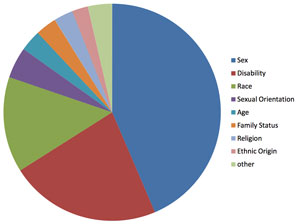Half of the discrimination complaints made against lawyers and articling students in the last 10 years were related to gender, according to a 10-year equity report released by the Law Society of Upper Canada this week.

The
report also found that discrimination complaints on the basis of race and disability were prevalent as well. Of the 586 discrimination and harassment complaints made to the law society’s discrimination and harassment counsel, 26 per cent of complaints were based on disability and 16 per cent were on account of race. In five per cent of cases, complainants said they were discriminated against because of their sexual orientation and four per cent decried age-based discrimination.
“The report indicates that all forms of discrimination and harassment are still persistent in the legal world and confirms the need for law society programs such as those established through the law society’s retention of women initiatives,” says law society treasurer Thomas Conway. “The report findings also reinforce the value of work now underway by our working group on challenges faced by racialized licensees.”
When it comes to sex discrimination, pregnancy was specifically raised in 46 complaints. Some 151 callers reported sexual harassment, and four complainants raised gender identity.
“In almost every instance, the women who contacted the [discrimination and harassment counsel] with a sex-based complaint were reporting that they themselves had been the victim of sex discrimination or sexual harassment by a male lawyer or articling student, that they had suffered employment reprisals after making a complaint of sexual harassment against a male colleague, supervisor or client, or that they had suffered discrimination in their employment due to the fact that they were pregnant and/or had taken a maternity leave,” the report noted.
In contrast, 45 per cent of male callers who reported harassment based on sex were concerned about the way women or gay men they knew were treated.
Despite their growing numbers, the report also said practising law remains a challenge for Ontario’s racialized lawyers due to discrimination.
“The statistical data, research findings and anecdotal evidence suggest that notwithstanding the increase in representation of racialized lawyers, they still face challenges in the practice of law,” the report said.
The report’s findings reiterate the importance of the law society’s discrimination and harassment counsel program, Conway said.
“We will continue to look at ways to address and prevent discrimination and harassment in the legal profession and address ongoing challenges.”

 The report also found that discrimination complaints on the basis of race and disability were prevalent as well. Of the 586 discrimination and harassment complaints made to the law society’s discrimination and harassment counsel, 26 per cent of complaints were based on disability and 16 per cent were on account of race. In five per cent of cases, complainants said they were discriminated against because of their sexual orientation and four per cent decried age-based discrimination.
The report also found that discrimination complaints on the basis of race and disability were prevalent as well. Of the 586 discrimination and harassment complaints made to the law society’s discrimination and harassment counsel, 26 per cent of complaints were based on disability and 16 per cent were on account of race. In five per cent of cases, complainants said they were discriminated against because of their sexual orientation and four per cent decried age-based discrimination.